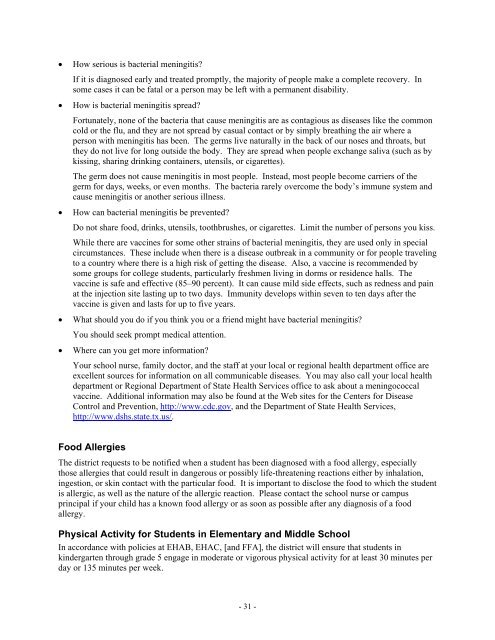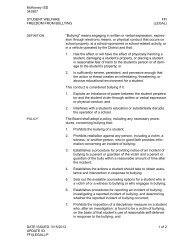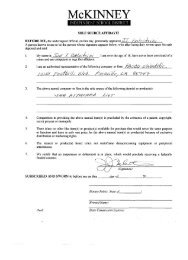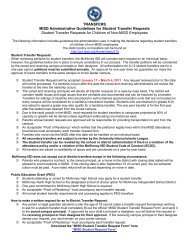2011-2012 Student Handbook - McKinney Independent School District
2011-2012 Student Handbook - McKinney Independent School District
2011-2012 Student Handbook - McKinney Independent School District
- No tags were found...
You also want an ePaper? Increase the reach of your titles
YUMPU automatically turns print PDFs into web optimized ePapers that Google loves.
• How serious is bacterial meningitis?If it is diagnosed early and treated promptly, the majority of people make a complete recovery. Insome cases it can be fatal or a person may be left with a permanent disability.• How is bacterial meningitis spread?Fortunately, none of the bacteria that cause meningitis are as contagious as diseases like the commoncold or the flu, and they are not spread by casual contact or by simply breathing the air where aperson with meningitis has been. The germs live naturally in the back of our noses and throats, butthey do not live for long outside the body. They are spread when people exchange saliva (such as bykissing, sharing drinking containers, utensils, or cigarettes).The germ does not cause meningitis in most people. Instead, most people become carriers of thegerm for days, weeks, or even months. The bacteria rarely overcome the body’s immune system andcause meningitis or another serious illness.• How can bacterial meningitis be prevented?Do not share food, drinks, utensils, toothbrushes, or cigarettes. Limit the number of persons you kiss.While there are vaccines for some other strains of bacterial meningitis, they are used only in specialcircumstances. These include when there is a disease outbreak in a community or for people travelingto a country where there is a high risk of getting the disease. Also, a vaccine is recommended bysome groups for college students, particularly freshmen living in dorms or residence halls. Thevaccine is safe and effective (85–90 percent). It can cause mild side effects, such as redness and painat the injection site lasting up to two days. Immunity develops within seven to ten days after thevaccine is given and lasts for up to five years.• What should you do if you think you or a friend might have bacterial meningitis?You should seek prompt medical attention.• Where can you get more information?Your school nurse, family doctor, and the staff at your local or regional health department office areexcellent sources for information on all communicable diseases. You may also call your local healthdepartment or Regional Department of State Health Services office to ask about a meningococcalvaccine. Additional information may also be found at the Web sites for the Centers for DiseaseControl and Prevention, http://www.cdc.gov, and the Department of State Health Services,http://www.dshs.state.tx.us/.Food AllergiesThe district requests to be notified when a student has been diagnosed with a food allergy, especiallythose allergies that could result in dangerous or possibly life-threatening reactions either by inhalation,ingestion, or skin contact with the particular food. It is important to disclose the food to which the studentis allergic, as well as the nature of the allergic reaction. Please contact the school nurse or campusprincipal if your child has a known food allergy or as soon as possible after any diagnosis of a foodallergy.Physical Activity for <strong>Student</strong>s in Elementary and Middle <strong>School</strong>In accordance with policies at EHAB, EHAC, [and FFA], the district will ensure that students inkindergarten through grade 5 engage in moderate or vigorous physical activity for at least 30 minutes perday or 135 minutes per week.- 31 -
















